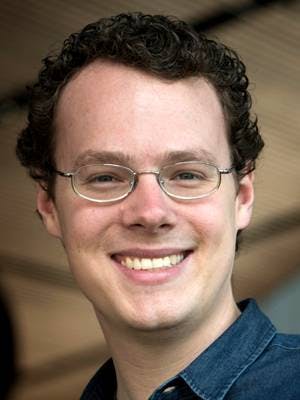 Literary Fellow at Arena Stage
Literary Fellow at Arena Stage
Washington, D.C.
Theatre major 2011
Unclear what a dramaturg is? Don’t worry, Paul Adolphsen is happy to break it down. “I like to describe ‘dramaturgy’ by turning to its etymology,” he says. The Greek roots of the word mean “drama” and “work.” “So dramaturgy can be considered the ‘work of the drama.’” This “work” might be helping a playwright develop a script, researching historical context for the cast and crew of a production, or talking with audiences to help “enrich their experience.”
Adolphsen is currently the Allen Lee Hughes Literary Fellow at the Arena Stage in Washington, D.C. This allows him to tap into his many skills as a dramaturg, educator, and writer. Prior to this, Adolphsen was given the opportunity to practice dramaturgy with Seattle Pacific University’s Theatre Department. During SPU’s 2010–11 season, Professor of Theatre Andrew Ryder allowed Adolphsen to serve as a dramaturg for the department’s productions.
In-depth and hands-on experiences gave him the credentials for admittance into one of the five dramaturgy programs in the country. When he reflects on his journey, Adolphsen can’t help but put his experiences in context of the theatre.
“In thinking about success for myself, I’ve taken inspiration from the lessons of the rehearsal room,” he says. “In the theatre it’s easy to value product, but much more difficult to live fully into the messy and often confusing process of creation. When thinking about success for yourself, try to put it in terms of ‘process’ not ‘product.’”
— Dusty Henry

As a dramaturg, Adolphsen studies theatre in service to directors, actors, and others involved in theatrical productions. He has taught several college-level theatre courses.
How does your time at SPU connect to the work you’re doing today?
At SPU I was given the space to explore dramaturgy in the classroom and in production, and this mix of theory and practice set me up well for my future work in both the professional theatre and the academy.
SPU‘s Department of Theatre was a community in which I could experiment and learn while also being supportive of others. This ethic of generosity, openness, and support has deeply informed my current work both with artists and with students.
Who made a difference in your SPU education?
While at SPU I took an independent study course with Dr. Andrew Ryder in dramaturgy and served as as the production dramaturg for the 2010–2011 season. This set me up well both to pursue an internship in dramaturgy after graduation and to gain admission to one of five dramaturgy MFA programs in the U.S.
Dr. Ryder was an insightful and generous mentor, holding me to a high standard in my writing and my production work, while also giving me the room I needed to explore dramaturgy on my own terms.
What advice do you have for students about life after graduation?
Maintain old relationships while seeking out new ones. Value people and community. Stay curious and open. And finally: Spend some time after graduation thinking about what “success” means for you.




